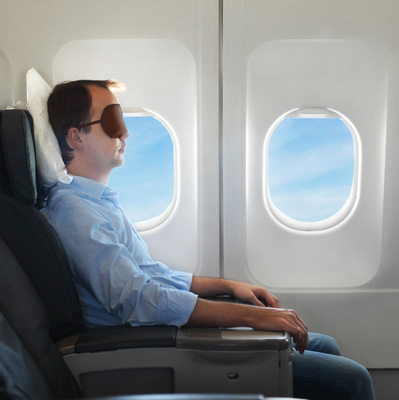Many travelers plan to sleep on planes when they have early morning or late night flights, as well as when the trip is going to be long and complex. Unfortunately, not everyone has the ability to sleep easily in transit.
If you have trouble sleeping on planes, you’re not alone; a surprising percentage of travelers simply can’t nod off in this environment. A few tips can help improve your chances of getting a good rest on your next flight, however.
1. Seating choices – Many travelers prefer an aisle seat, but this can make it very difficult to take a nap. If you know you’d like to sleep on the plane, pick a window position whenever possible. This gives you a place to rest your head and prevents seatmates from disturbing you if they need to move.
2. Skip the coffee – When it’s time to head out to an early morning flight, you might want to pick up a big mug of coffee to feel more lively. Unfortunately, while the caffeine might make it easier to keep up with security procedures, it’ll keep you from sleeping on planes in most cases. Avoid caffeine if you know you don’t want to be awake for the flight.
3. Choose comfortable clothes – In addition to bothersome security requirements, there’s one more reason to choose loose, comfortable clothing instead of anything tight or extremely dressy. Sleeping is much more difficult in clothing that itches, constricts or feels unusual. Try to wear layers of loose breathable clothing to make up for potential cabin temperature changes.
4. Bring a pillow or blanket – Once standard on airplanes, pillows and blankets are now frequently absent or available only for a fee. Consider bringing your own small, inflatable pillow and compact blanket to keep yourself comfortable. Remember to put on the blanket first, then the seat belt. This keeps the flight attendant from waking you up to check your belt for safety purposes.
5. Stay hydrated – Drinking water is a delicate balance when it comes to flying. You don’t want to drink so much that you wake up and have to use the plane’s restroom, but it’s still important to remain hydrated. Planes are frequently dry and feeling thirsty could keep you from getting restful sleep.
6. Cut out excess stimuli – Light and unfamiliar sounds will keep you from sleeping on planes as well as in many other environments. Consider bringing a pair of earplugs or noise-canceling headphones to block out other passengers’ conversation as well as engine noise. Bring a comfortable sleep mask to provide a dark environment that promotes healthy sleep.
7. Sleep aids are a last resort – If it’s absolutely necessary for you to get sleep on the plane, you might want to consider using a sleep aid. Whether it’s a medication or a natural hormone such as melatonin, these substances can help you drift off and stay asleep. Unfortunately, they can also cause problems on short flights, since you might wake up groggy if the sleep aid is still in your system.
Do you have any additional ideas to share? We welcome all suggestions!

